
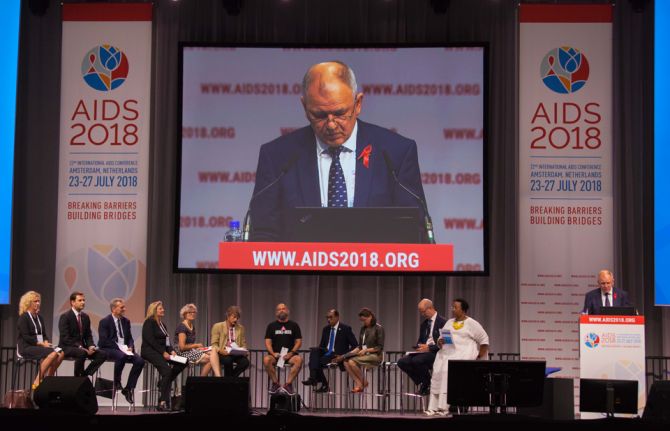
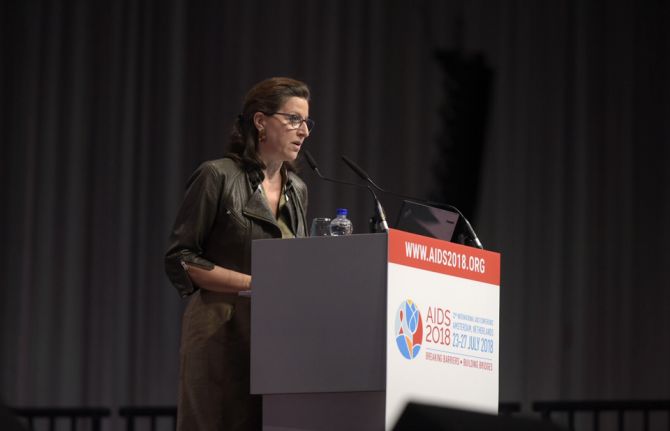
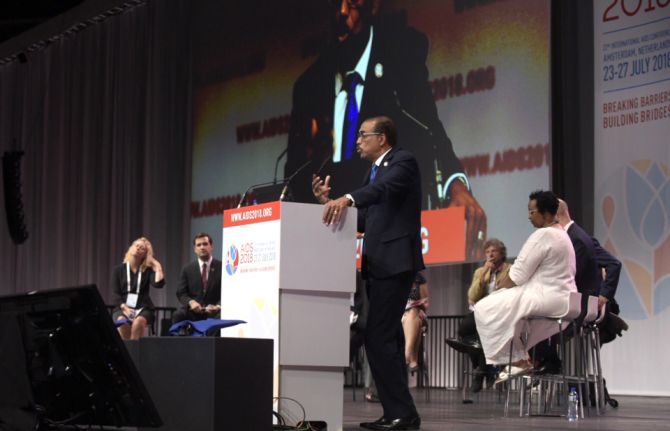
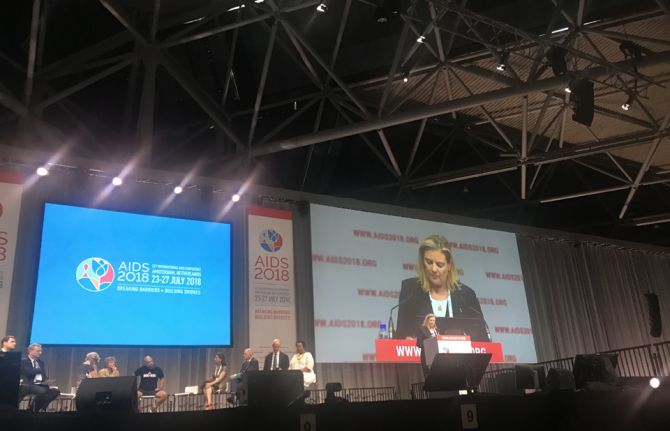
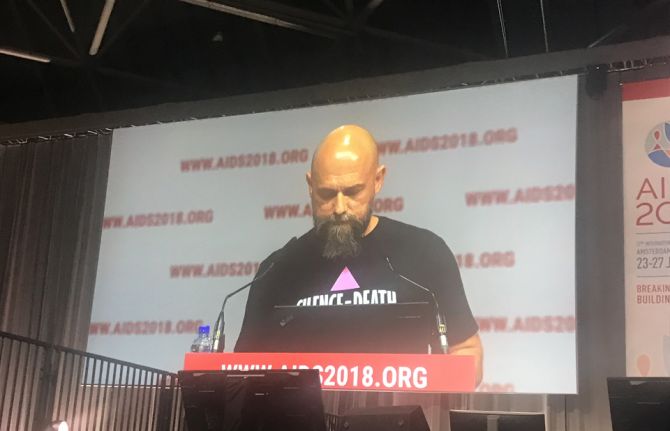
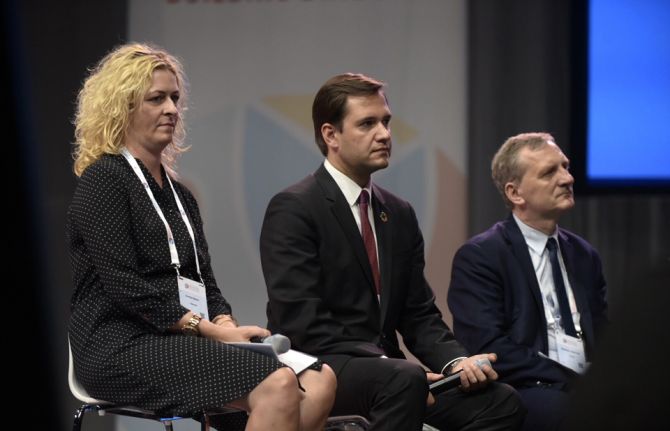
Feature Story
Reaching the 10-10-10 will put Europe on track to achieving the SDG targets
25 July 2018
25 July 2018 25 July 2018European Union political leaders met to discuss the successes, challenges and future priorities for addressing HIV in Europe at ministerial meeting in the margins of the 2018 AIDS conference.
The session started with a powerful appeal from the European civil society co-chair Esther Dixon-Williams (European AIDS Treatment Group) to ensure people living with HIV and key populations remain central to the discussions in keeping with the call from the inception of the AIDS response “nothing about us without us”.
A few European Union (EU) countries are on track to reach the 90-90-90 goals, however to reach the target of ending AIDS by 2030 and leaving no one behind, increased efforts to reach out to men who have sex with men, transgender people, migrants, sex workers, people who inject drugs and people in detention are needed.
The rising epidemic among men who have sex with men in central and south eastern Europe was highlighted as well as the continuing emergency for people who use drugs in the eastern European states. HIV-related stigma and the criminalisation of people who use drugs, sex workers, MSM, transgender people are major obstacles to seeking, accessing or staying on treatment. Understanding this stigma and reducing it should be a key priority in the months and years ahead for the European Union institutions and its EU member states. Civil Society drew attention to the Ljubljana Declaration 2.0, a call for urgent action in response to rapidly expanding HIV epidemics among gay men, other men who have sex with men and trans people in newer EU member states and enlargement countries
Important announcements were made by Germany, France and the Netherlands highlighting that increasing demand and making pre-exposure prophylaxis (PREP) available and reimbursed nationally for all is a priority within the next months. It was highlighted that Europe needs to do more to ensure the right to health of migrants is respected. Migrants must be protected from increased vulnerability to HIV to access needed health services regardless of residency or insurance status and that they are not returned to countries where there is no real access to treatment.
The ministerial meeting provided an opportunity to showcase the tremendous contribution European Union member states countries and the European Commission have made to the AIDS response globally and within their own borders. Participants highlighted that together the individual EU Member States and the EU itself via the European Commission contribute significantly to international funding for the AIDS response. The next Global Fund replenishment will be hosted in Paris, France in 2019. The role of the European Union is even more critical as international funding flatlines and the need is great for support particularly for countries in Eastern Europe and Central Asia.
The session was also an opportunity to hear about the innovations and excellent practices in some countries in the region. Speakers highlighting the importance of supportive legal environments and engagement of affected communities. Portugal highlighted its commitment to the agenda and the difference that introducing harm reduction approach has made as it has seen a drastic reduction in new HIV infections. The European Commission showed how an integrated approach to HIV, TB, viral hepatitis and STIs, as well as legal frameworks allowing for community engagement in health service delivery outside of medical settings is the way to reach more people and maximise investments at countries level. This approach underpins the achievement of the Sustainable Development Goals on health and on justice. The city of Amsterdam showed it has virtually reached 90-90-90 with a city policy that supports the right to health, coordination between stakeholders and an inclusive and innovative environment for all citizens in the city. Speakers also highlighted the expanding epidemic in Eastern Europe and the need for increased collaboration with the region.
A focus on integrated health services, rights, reaching those at risk of being left behind and inclusiveness is emerging in a number of EU member states. Yet there is only twelve years to 2030 and efforts need to be sustained and expanded to ensure that Europe is on the Fast Track to ending AIDS – leaving no one behind
Quotes
"We are making progress – on health and many other parts of the 2030 Agenda. But that deadline is getting closer. We need to accelerate our efforts and ramp up our collaborative partnerships."
"The target to end AIDS can only be a collective one. This is why France is the second historical contributor to the Global Fund with a contribution of 4.2 Billion euros since 2002. Within our own countries we need to ensure comprehensive access to HIV prevention services including condoms, PREP, treatment as prevention and information on U=U among youth, LGBTI groups, sex workers and migrants."
"We aim at providing person-centred and holistic prevention and care interventions for people in need without leaving anyone behind. As part of the strategy we therefore defined both national and international areas of action to work towards an open and non-discriminatory environment with equal access to integrated and comprehensive prevention, testing and care services for everyone."
"European Union Member States play an important role in the AIDS response: as donors, as innovators, and as brokers of political engagement. What the EU does internationally it also needs to practice it at home."
"We cannot stay silent, we all must step out of our comfort zones and draw attention to communities and regions like MSM in Central and Southeast Europe, which are left behind in the HIV response. The East of the EU is far from the 90-90-90."
"Europe is blind on health needs of its migrants; security concerns prevail. Restrictive policies increase high risks. We need independent data on availability and accessibility of treatment in the EU, managed by civil society"



